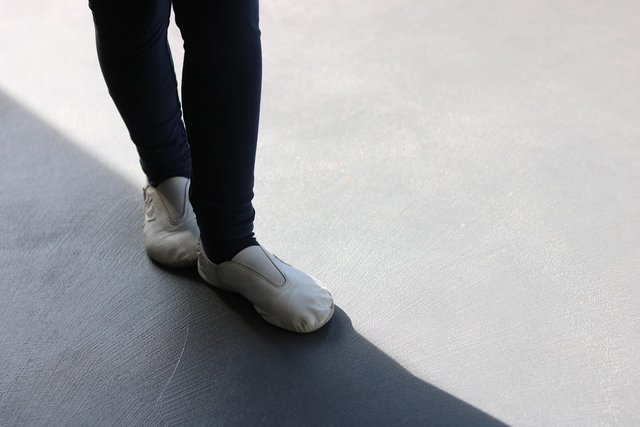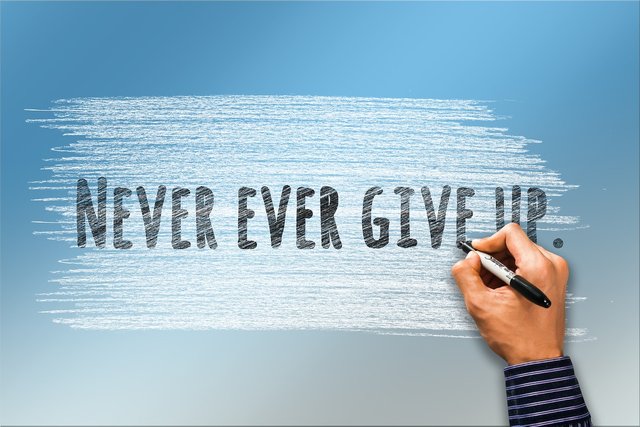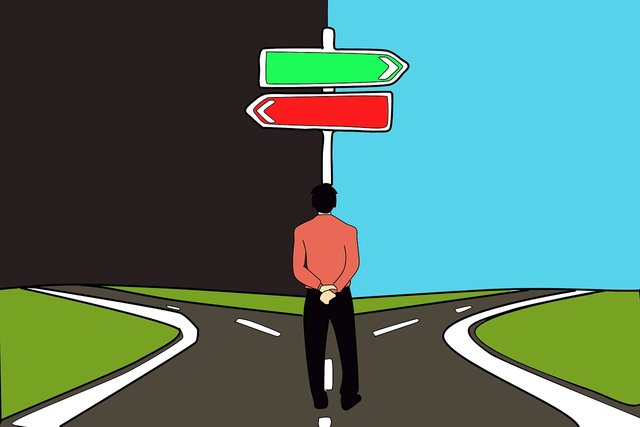Discipline: The One Exercise that Brings More than Any Other
Discipline: The One Exercise that Brings More than Any Other
So you want more discipline? The good news is you can do something. You can strengthen, train and expand your discipline.
But I also want to be honest with you: Unfortunately, there is no simple button with which you can click on your discipline and willpower. As an adult, we know: it's not that easy. Even if we sometimes wish that.
On the other hand, it is not terribly complicated to develop more self-discipline.
It's not that hard to learn how to play the guitar. Or a new foreign language. It really is not that hard. But a little bit of work is already. It takes a little time. Maybe a few minutes a day. For maybe 30 days. So nothing that you could not do.
You have to know that about discipline
Before you learn how to develop your discipline, let's take a closer look at what discipline is all about. Just so we're sure we're talking about the same thing.
And so to absorb such a description as the following, but that alone often helps to activate and strengthen the quality of discipline in oneself.
So. What is discipline exactly?
Discipline is when you do it anyway, even if you just do not feel like it. Or when you are tired or have a bad day.
Discipline is when you go the difficult road and not the path of least resistance. If you say no to the simpler and more enjoyable alternatives. And yes to what you have set for yourself.
Discipline is when you go the direct route, rather than doing a lot of small evasive maneuvers on a task.
Discipline is when you finish it right away instead of putting the matter in front of you.
Discipline is when you take the effort and the pain today to enjoy benefits later. If you study today for the exam, you'll eventually graduate and earn more money.
Discipline means being able to resist temptations.
Discipline means investing work today to make it easier later. Instead of making it easier for me today and then later having stress and annoyance. So if I do not pay the bill today and later have to pay dunning fees.
Discipline means setting up smart rules for your own good. And then to follow them permanently. Sometimes it also means accepting the existing rules of a group and then focusing on them if you want to be part of that group. That too is discipline.
Discipline has a lot to do with reason. Discipline means using the mind. So think about what you want to do and what you want to do. And then put your feelings, your moods and your unconscious and irrational impulses back for a while in favor of the head decision.
Does discipline mean giving up pleasure?
That with the discipline sounds admittedly only fun. But in fact, disciplined people are often healthier and happier. Especially if you set goals in life that increase your quality of life. And if you pursue these goals then disciplined.
And even if practicing discipline is often exhausting and costs self-conquest, it often leads to a lot of good feelings later on: more self-confidence. To your satisfaction. And the good feeling that you have achieved something. And that you have your life under control.
A bit of discipline today often leads to good luck and happiness later. Discipline is a good investment in the future.
Use your discipline wisely
Being disciplined does not automatically lead to more happiness in life. The trick is actually to put your discipline at the service of goodies. To discipline yourself for a job that makes you unhappy may not be a good idea. Or you starve disciplined under your normal weight because of a divorced beauty ideal, I find personally questionable.
Discipline is well used if it makes your life better in the long run. If she extends your possibilities for the future. If she allows you to live your life more according to your wishes, values and rules. Or if your discipline makes you stronger and more capable as a human being. These are wonderful fields of application for your willpower and your discipline.
Discipline must make your life better. Or that of your loved ones. Otherwise it is only given away energy.
So you strengthen your discipline
So. Now we finally come to the best and easiest way to strengthen your discipline.
So you often manage to implement your intentions in a disciplined way.
So you can often say no to the things you do not want to do anymore.
The whole thing works like this:
You train it in very small and painless steps to use your discipline. Because you learn something by doing it. Again and again. By making targeted and planned very easy unpleasant things and then doing them. And over time, you slowly get up and take on difficult things.
You are looking for something that you do not like doing first. Let's say clean up the dishwasher. Or to sort receipts.
You formulate a clear resolution with a serious expression: "I will do that now. I will now clear out the dishwasher. "
And after you've formulated your intent, you just do it. Immediately. Without delaying it. Without delay.
It is important that you do not start with difficult tasks at the beginning.
The difficulty level of your task should have a maximum of 1, 2 or 3 on a scale of 1 to 10. Where 1 is slightly uncomfortable and 10 for the greatest possible pain.
A 2 might be to take down the garbage, even if it drizzles outside. A 10 would be to cut oneself off a leg, because it would be beyond saving. You understand what I mean.
In the beginning it is important to choose a task that is a bit difficult, but not too much.
Because you want to do this exercise for at least 30 days every day. And if you overburden yourself at the beginning, then you start postponing it. The trick is always to stay under the radar of your internal resistance. But over time, by daily practice, move the tolerance limit of your radar upwards. So that you can let go of your discipline over time to more and more difficult tasks.
So you train yourself with awareness and mindfulness to avoid avoiding unpleasant things. But this easy to do. Even if it does not cause any joy in you.
Because that's what discipline ultimately means: I make myself do unpleasant, boring, exhausting things.
And you only learn that by practicing it.
This is how you practice your discipline step by step
Here again the practice procedure step by step.
Step 1: Make a real decision
The first step is to make a real decision. Because so often we pretend to something and then after a few days stop it because somehow life comes in between. Or because we lose the desire.
To really strengthen your discipline, you would need to invest at least 30 days. 30 days of taking a few minutes each day.
And here it is really necessary that you make a real decision in the beginning. So that you promise yourself in the hand:
"Hey, I'm going through this for 30 days now. Giving up is not an option. I pull that through. I do that because it's important to me. And I will overcome my reluctance and resistances. I do this for 30 days. Promised."
Step 2: Create an exercise plan
Next, make an exercise plan that lets you check off for just 30 days that you've done your training.
Just take a white sheet and draw 30 small boxes on it. And every day you have completed your training, you check the box.
Such a daily performance measurement makes a big difference.
Because this simple piece of paper is a visual representation of your progress and your training achievements.
So create a training plan and use it in the next 30 days.
Step 3: Make a list of unpleasant tasks
Now you take another piece of paper and write a list of typical tasks that are somehow difficult for you. Tasks to which you have to go. Or tasks that you postpone regularly. Maybe even tasks that you put off for a long time.
Incidentally, this can also be things that you actually like to do, but to which you still often cannot get up.
And behind each of the tasks you write the difficulty on a scale of 1 to 10.
The longer a task lasts, the harder it usually gets. What often makes a task difficult is, if we do not see clearly, what exactly needs to be done for the task. Or if we somehow do not trust the task. Or if we are even afraid of the task. For example, before difficult talks.
So make a list of your difficult tasks and give each a number on the difficulty scale. The purpose of this list is to have a set of tasks that you can practice with.
Step 4: Do it
Then comes the part that lasts 30 days.
Every day, you think about what you want to do from your list of difficult tasks today.
Choose a difficult task.
Formulate these as intent. Best with a serious and angry expression that expresses your bite.
Say to yourself:
"I'll do it now. No delay. No hesitation. I just do it. "
And then you just do it. Immediately. Without hesitation. In one go. So without interrupting yourself in between. Until you make it.
At the beginning of your 30 days, you choose tasks with the difficulty level of 1, 2 or 3. Over time, you can then perform even more difficult tasks.
But it is important that you climb slowly here. For example, by completing a maximum of 3-man tasks in the first week.
In week 2 then maximum 4-man tasks. In the 3rd week 5-work tasks etc.
Although I do not always do every day a maximum of difficult tasks. It is also good for the training if you let in an easier task from time to time.
By the way, you can do 2 or 3 tasks per day if you have a lot of energy. But that would be the freestyle and not the duty.
The duty is a difficult task per day.
Discipline as a way
These are the 4 steps. As a training for 30 days, tackle a difficult task every day. And I promise you that your discipline has made a tangible step forward after the 30 days.
However, this targeted and systematic completion of difficult things can do much more than just increase your discipline.
After all, it's true that the most difficult things are usually those that make the most of our lives. And so doing this difficult thing in it can just make your life better and more beautiful.
You will also see that your self-confidence improves. Because you are increasingly aware that you can rely on yourself. Because you show yourself that you can handle more difficult things again and again.
In this sense, "Every Day a Difficult Task" can be a path of development for you to make your life better and better.
One could say: discipline as a way. A way to a life with more of the good things.



Congratulations @boxofin! You have completed the following achievement on the Steem blockchain and have been rewarded with new badge(s) :
You can view your badges on your Steem Board and compare to others on the Steem Ranking
If you no longer want to receive notifications, reply to this comment with the word
STOPTo support your work, I also upvoted your post!
Vote for @Steemitboard as a witness to get one more award and increased upvotes!